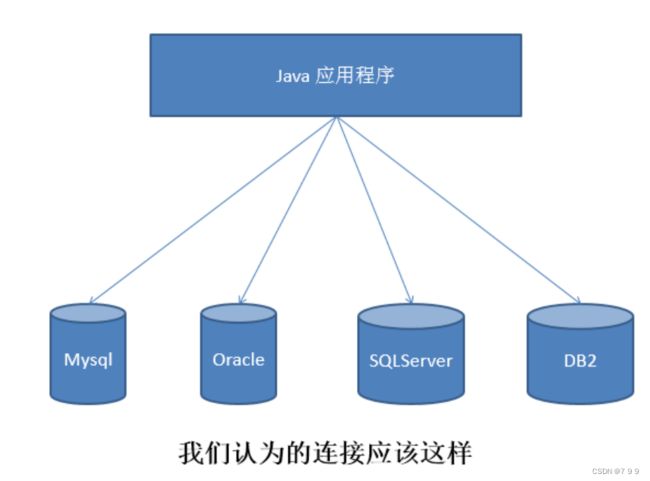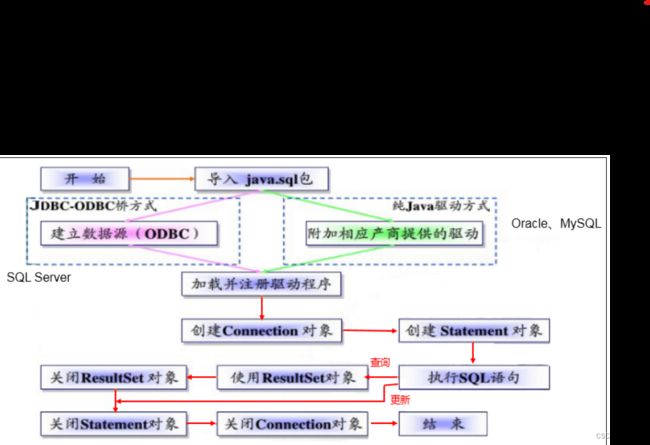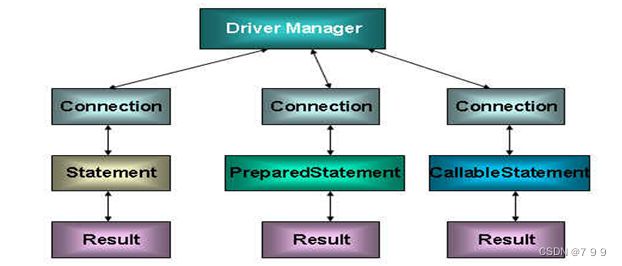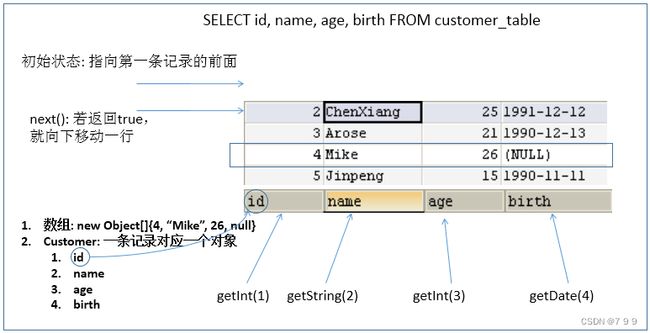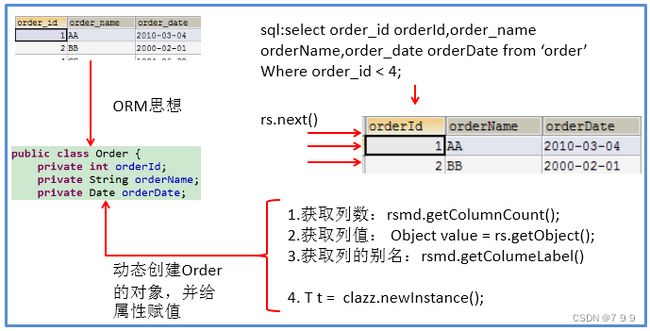<JDBC>
文章目录
- 1.JDBC核心技术
-
- 1.数据的持久化
- 2.JAVA中的数据存储技术
- 3.JDBC介绍
- 4.JDBC体系结构
- 5.JDBC程序编写步骤
- 2.获取数据库连接
-
- 1.Driver接口实现类
- 2.注册与加载JDBC驱动
- 3.URL
- 4.用户和密码
- 3. PreparedStatement 和 Statement
-
- 1.PreparedStatement介绍
- 2. PreparedStatement vs Statement
-
- 1.登录Statement实现案例
- 2.登录ParepareStatement实现案例
- 4.JDBC的CRUD实现
-
- 1.程序的分层
- 2.领域模型(实体类)
-
- Dao
- 3.写出JdbcUtil 工具类去除重构代码
- ResultSet和ResultSetMetaData
-
- 1 ResultSet
- 2 ResultSetMetaData
-
- 问题1:得到结果集后, 如何知道该结果集中有哪些列 ? 列名是什么?
- 问题2:关于ResultSetMetaData
- 使用BsaeDao再次减少重构
1.JDBC核心技术
1.数据的持久化
- 持久化(persistence):把数据保存到可掉电式存储设备中以供之后使用。大多数情况下,特别是企业级应用,数据持久化意味着将内存中的数据保存到硬盘上加以”固化”,而持久化的实现过程大多通过各种关系数据库来完成。
- 持久化的主要应用是将内存中的数据存储在关系型数据库中,当然也可以存储在磁盘文件、XML数据文件中。
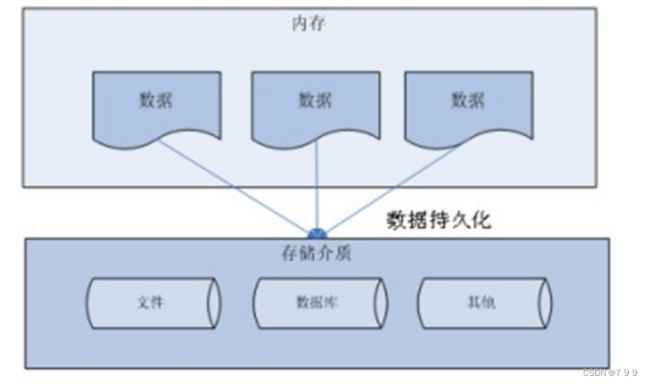
2.JAVA中的数据存储技术
- 在Java中,数据库存取技术可分为如下几类:
- JDBC直接访问数据库
- JDO (Java Data Object )技术
- 第三方O/R工具,如Hibernate, Mybatis 等
- JDBC是java访问数据库的基石,JDO、Hibernate、MyBatis等只是更好的封装了JDBC。
3.JDBC介绍
- JDBC(Java Database Connectivity)是一个独立于特定数据库管理系统、通用的SQL数据库存取和操作的公共接口(一组API),定义了用来访问数据库的标准Java类库,(java.sql,javax.sql)使用这些类库可以以一种标准的方法、方便地访问数据库资源。
- JDBC为访问不同的数据库提供了一种统一的途径,为开发者屏蔽了一些细节问题。
- JDBC的目标是使Java程序员使用JDBC可以连接任何提供了JDBC驱动程序的数据库系统,这样就使得程序员无需对特定的数据库系统的特点有过多的了解,从而大大简化和加快了开发过程。
总结
4.JDBC体系结构
JDBC接口(API)包括两个层次:
- 面向应用的API:Java API,抽象接口,供应用程序开发人员使用(连接数据库,执行SQL语句,获得结果)。
- 面向数据库的API:Java Driver API,供开发商开发数据库驱动程序用
JDBC是sun公司提供一套用于数据库操作的接口,java程序员只需要面向这套接口编程即可。
不同的数据库厂商,需要针对这套接口,提供不同实现。不同的实现的集合,即为不同数据库的驱动。
————面向接口编程
5.JDBC程序编写步骤
补充:ODBC(Open Database Connectivity,开放式数据库连接),是微软在Windows平台下推出的。使用者在程序中只需要调用ODBC API,由 ODBC 驱动程序将调用转换成为对特定的数据库的调用请求
2.获取数据库连接
1.Driver接口实现类
java.sql.Driver 接口是所有 JDBC 驱动程序需要实现的接口。这个接口是提供给数据库厂商使用的,不同数据库厂商提供不同的实现。
在程序中不需要直接去访问实现了 Driver 接口的类,而是由驱动程序管理器类
(java.sql.DriverManager)去调用这些Driver实现。
- Oracle的驱动:oracle.jdbc.driver.OracleDriver
- mySql的驱动: com.mysql.jdbc.Driver
2.注册与加载JDBC驱动
- 加载驱动:加载 JDBC 驱动需调用 Class 类的静态方法 forName(),向其传递要加载的 JDBC 驱动的类名
- Class.forName(“com.mysql.jdbc.Driver”);
- 注册驱动:DriverManager 类是驱动程序管理器类,负责管理驱动程序
- 使用DriverManager.registerDriver(com.mysql.jdbc.Driver)来注册驱动
- 通常不用显式调用 DriverManager 类的 registerDriver() 方法来注册驱动程序类的实例,因为 Driver 接口的驱动程序类都包含了静态代码块,在这个静态代码块中,会调用DriverManager.registerDriver() 方法来注册自身的一个实例。
3.URL
- JDBC URL 用于标识一个被注册的驱动程序,驱动程序管理器通过这个 URL 选择正确的驱动程序,从而建立到数据库的连接。
- JDBC URL的标准由三部分组成,各部分间用冒号分隔。
- jdbc:子协议:子名称
- 协议:JDBC URL中的协议总是jdbc
- 子协议:子协议用于标识一个数据库驱动程序
- 子名称:一种标识数据库的方法。子名称可以依不同的子协议而变化,用名称的目的是为了定位数据库提供足够的信息。包含主机名(对应服务端的ip地址),端口号,数据库名
MySQL的连接URL编写方式:
- jdbc:mysql://主机名称:mysql服务端口号/数据库名称?参数=值&参数=值
- jdbc:mysql://localhost:3306/jdbc_demo
- jdbc:mysql://localhost:3306/jdbc_demo?
useUnicode=true&characterEncoding=utf8(如果JDBC程序与服务器端的字符集不一致,会导致乱码,那么可以通过参数指定服务器端的字符集) - jdbc:mysql://localhost:3306/jdbc_demo?user=root&password=123456
Oracle 9i的连接URL编写方式:
- jdbc:oracle:thin:@主机名称:oracle服务端口号:数据库名称
- jdbc:oracle:thin:@localhost:1521:jdbc_demo
SQLServer的连接URL编写方式:
- jdbc:sqlserver://主机名称:sqlserver服务端口号:DatabaseName=数据库名称
- jdbc:sqlserver://localhost:1433:DatabaseName=jdbc_demo
4.用户和密码
- user,password可以用“属性名=属性值”方式告诉数据库
- 可以调用 DriverManager 类的 getConnection() 方法建立到数据库的连接
连接方式:
@Test
public void testConnection4() {
try {
//1.数据库连接的4个基本要素:
String url = "jdbc:mysql://localhost:3306/test";
String user = "root";
String password = "abc123";
String driverName = "com.mysql.jdbc.Driver";
//2.加载驱动 (①实例化Driver ②注册驱动)
Class.forName(driverName);
//Driver driver = (Driver) clazz.newInstance();
//3.注册驱动
//DriverManager.registerDriver(driver);
/*
可以注释掉上述代码的原因,是因为在mysql的Driver类中声明有:
static {
try {
DriverManager.registerDriver(new Driver());
} catch (SQLException var1) {
throw new RuntimeException("Can't register driver!");
}
}
*/
//3.获取连接
Connection conn = DriverManager.getConnection(url, user,
password);
System.out.println(conn);
} catch (Exception e) {
e.printStackTrace();
}
}
连接方式二
@Test
public void testConnection5() throws Exception {
//1.加载配置文件
InputStream is =
ConnectionTest.class.getClassLoader().getResourceAsStream("jdbc.properties")
;
Properties pros = new Properties();
pros.load(is);
//2.读取配置信息
String user = pros.getProperty("user");
String password = pros.getProperty("password");
String url = pros.getProperty("url");
String driverClass = pros.getProperty("driverClass");
//3.加载驱动
Class.forName(driverClass);
//4.获取连接
Connection conn = DriverManager.getConnection(url,user,password);
System.out.println(conn);
}
其中配置文件声明在工程的src目录下jdbc.properties
user=root
password=abc123
url=jdbc:mysql://localhost:3306/test
driverClass=com.mysql.jdbc.Driver
说明:使用配置文件的方式保存配置信息,在代码中加载配置文件
使用配置文件的好处:
①实现了代码和数据的分离,如果需要修改配置信息,直接在配置文件中修改,不需要深入代码
②如果修改了配置信息,省去重新编译的过程。
3. PreparedStatement 和 Statement
- 数据库连接被用于向数据库服务器发送命令和 SQL 语句,并接受数据库服务器返回的结果。其实一个数据库连接就是一个Socket连接。
- 在 java.sql 包中有 3 个接口分别定义了对数据库的调用的不同方式:
- Statement:用于执行静态 SQL 语句并返回它所生成结果的对象。
- PrepatedStatement:SQL 语句被预编译并存储在此对象中,可以使用此对象多次高效地执行该语句。
- CallableStatement:用于执行 SQL 存储过程
1.PreparedStatement介绍
- 可以通过调用 Connection 对象的 preparedStatement(String sql) 方法获取 PreparedStatement 对象
- PreparedStatement 接口是 Statement 的子接口,它表示一条预编译过的 SQL 语句
- PreparedStatement 对象所代表的 SQL 语句中的参数用问号(?)来表示,调用 PreparedStatement 对象的 setXxx() 方法来设置这些参数. setXxx() 方法有两个参数,第一个参数是要设置的 SQL 语句中的参数的索引(从 1 开始),第二个是设置的 SQL 语句中的参数的值
2. PreparedStatement vs Statement
- PreparedStatement 能最大可能提高性能:
- DBServer会对预编译语句提供性能优化。因为预编译语句有可能被重复调用,所以语句在被DBServer的编译器编译后的执行代码被缓存下来,那么下次调用时只要是相同的预编译语句就不需要编译,只要将参数直接传入编译过的语句执行代码中就会得到执行。
- 在statement语句中,即使是相同操作但因为数据内容不一样,所以整个语句本身不能匹配,没有缓存语句的意义.事实是没有数据库会对普通语句编译后的执行代码缓存。这样每执行一次都要对传入的语句编译一次。
- (语法检查,语义检查,翻译成二进制命令,缓存)
- PreparedStatement 可以防止 SQL 注入
- Statement需要拼接SQL语句代码繁琐,存在SQL注入问题
1.登录Statement实现案例
public class StatementTest {
public static void main(String[] args) throws ClassNotFoundException, SQLException {
Class.forName("com.mysql.cj.jdbc.Driver");
Scanner sc = new Scanner(System.in);
System.out.println("请输入用户名");
String username =sc.nextLine();
System.out.println("请输入密码");
String password =sc.nextLine();
Connection connection = DriverManager.getConnection("jdbc:mysql://localhost:3306/test","root","root");
Statement ps = connection.createStatement();
ResultSet rs = ps.executeQuery("select user,password from user_table where user='"+username+"'and password ='"+password+"' ");
if (rs.next()){
System.out.println("登录成功!");
}else {
System.out.println("登录失败!");
}
rs.close();
ps.close();
connection.close();
}
}
2.登录ParepareStatement实现案例
public class PrepareStatementTest {
public static void main(String[] args) throws ClassNotFoundException, SQLException {
Class.forName("com.mysql.cj.jdbc.Driver");
Scanner sc = new Scanner(System.in);
System.out.println("请输入用户名");
String username =sc.nextLine();
System.out.println("请输入密码");
String password =sc.nextLine();
String sql="select user,password from user_table where user='"+username+"'and password ='"+password+"' ";
Connection connection = DriverManager.getConnection("jdbc:mysql://localhost:3306/test","root","root");
PreparedStatement ps = connection.prepareStatement(sql);
ResultSet rs = ps.executeQuery();
if(rs.next()){
System.out.println("登录成功");
}else{
System.out.println("登录失败");
}
rs.close();
ps.close();
connection.close();
}
}
4.JDBC的CRUD实现
1.程序的分层
- DAO(data access object):数据访问层(jdbc)
- Service:业务逻辑层(调用dao)
- Controller:控制层
- po:实体类,领域模型(persistence object)
2.领域模型(实体类)
创建表对应的实体类 ,表->类,字段->属性
| Java类型 | SQL类型 |
|---|---|
| boolean | BIT |
| byte | TINYINT |
| short | SMALLINT |
| int | INTEGER |
| long | BIGINT |
| String | CHAR,VARCHAR,LONGVARCHAR |
| byte array | BINARY , VAR BINARY |
| java.sql.Date | DATE |
| java.sql.Time | TIME |
| java.sql.Timestamp | TIMESTAMP |
Order类
public class Order {
private Integer orderId;
private String orderName;
private Date orderDate;
public Order() {
}
public Order(Integer orderId, String orderName, Date orderDate) {
this.orderId = orderId;
this.orderName = orderName;
this.orderDate = orderDate;
}
public Integer getOrderId() {
return orderId;
}
public void setOrderId(Integer orderId) {
this.orderId = orderId;
}
public String getOrderName() {
return orderName;
}
public void setOrderName(String orderName) {
this.orderName = orderName;
}
public Date getOrderDate() {
return orderDate;
}
public void setOrderDate(Date orderDate) {
this.orderDate = (java.sql.Date) orderDate;
}
@Override
public String toString() {
return "Order{" +
"orderId=" + orderId +
", orderName='" + orderName + '\'' +
", orderDate=" + orderDate +
'}';
}
}
User类
public class User{
private Integer id;
private String name;
private String password;
private String address;
private String phone;
public User() {
}
public User(Integer id, String name, String password, String address, String phone) {
this.id = id;
this.name = name;
this.password = password;
this.address = address;
this.phone = phone;
}
public Integer getId() {
return id;
}
public void setId(Integer id) {
this.id = id;
}
public String getName() {
return name;
}
public void setName(String name) {
this.name = name;
}
public String getPassword() {
return password;
}
public void setPassword(String password) {
this.password = password;
}
public String getAddress() {
return address;
}
public void setAddress(String address) {
this.address = address;
}
public String getPhone() {
return phone;
}
public void setPhone(String phone) {
this.phone = phone;
}
@Override
public String toString() {
return "User{" +
"id=" + id +
", name='" + name + '\'' +
", password='" + password + '\'' +
", address='" + address + '\'' +
", phone='" + phone + '\'' +
'}';
}
}
Dao
UserDao
public class UserDao {
Connection conn = DriverManager.getConnection("jdbc:mysql://localhost:3306/test", "root", "root");
public UserDao() throws SQLException {
}
public List<User> find() throws SQLException {
ArrayList<User> list = new ArrayList<>(10);
String sql =" SELECT `id`, `name`, `password`, `address`, `phone` from user";
PreparedStatement ps = conn.prepareStatement(sql);
ResultSet rs = ps.executeQuery();
while (rs.next()){
User user = new User();
user.setId(rs.getInt(1));
user.setName(rs.getString(2));
user.setPassword(rs.getString(3));
user.setAddress(rs.getString(4));
user.setPhone(rs.getString(5));
list.add(user);
}
rs.close();
ps.close();
return list;
}
public User findOne(Integer id) throws SQLException {
User user = new User();
String sql="SELECT `id`, `name`, `password`, `address`, `phone` from user where id = ?";
PreparedStatement ps = conn.prepareStatement(sql);
ps.setInt(1, id);
ResultSet rs = ps.executeQuery();
while (rs.next()){
user.setId(rs.getInt(1));
user.setName(rs.getString(2));
user.setPassword(rs.getString(3));
user.setAddress(rs.getString("address"));
user.setPhone(rs.getString("phone"));
}
rs.close();
ps.close();
return user;
}
public int insert(User user) throws SQLException {
int rows=0;
String sql="insert into user(`name`, `password`, `address`, `phone`) values(?,?,?,?)";
PreparedStatement ps = conn.prepareStatement(sql);
ps.setString(1,user.getName());
ps.setString(2,user.getPassword());
ps.setString(3,user.getAddress());
ps.setString(4,user.getPhone());
rows = ps.executeUpdate();
ps.close();
return rows;
}
public int delete(Integer id) throws SQLException {
String sql="delete from user where id =?";
int rows=0;
PreparedStatement ps = conn.prepareStatement(sql);
ps.setInt(1,id);
rows=ps.executeUpdate();
ps.close();
return rows;
}
}
OrderDao
public class OrderDao {
/**
* `order_id`, `order_name`, `order_date`
*/
/**
* 查询所有
* @return
*/
public List<Order> find() {
List<Order> list = new ArrayList<>(10);
String sql = "SELECT `order_id`, `order_name`, `order_date` from `order`";
Connection conn = null;
PreparedStatement ps = null;
ResultSet rs = null;
try {
conn = DriverManager.getConnection("jdbc:mysql://localhost:3306/test", "root", "root");
ps = conn.prepareStatement(sql);
rs = ps.executeQuery();
while (rs.next()) {
Order order = new Order();
order.setOrderId(rs.getInt(1));
order.setOrderName(rs.getString(2));
order.setOrderDate(rs.getDate(3));
list.add(order);
}
} catch (Exception e) {
e.printStackTrace();
} finally {
try {
if (rs != null && !rs.isClosed()) {
rs.close();
}
} catch (SQLException e) {
e.printStackTrace();
}
try {
if (ps != null && !ps.isClosed()) {
ps.close();
}
} catch (SQLException e) {
e.printStackTrace();
}
try {
if (conn != null && !conn.isClosed()) {
conn.close();
}
} catch (SQLException e) {
e.printStackTrace();
}
}
return list;
}
/**
* 查询主键对应的记录
* @param id
* @return
*/
public Order get(Integer id) {
Order order = new Order();
String sql = "SELECT `order_id`, `order_name`, `order_date` from `order` where `order_id` = ?";
Connection conn = null;
PreparedStatement ps = null;
ResultSet rs = null;
try {
conn = DriverManager.getConnection("jdbc:mysql://localhost:3306/test", "root", "root");
ps = conn.prepareStatement(sql);
ps.setInt(1, id);
rs = ps.executeQuery();
while (rs.next()) {
order.setOrderId(rs.getInt(1));
order.setOrderName(rs.getString(2));
order.setOrderDate(rs.getDate(3));
}
} catch (Exception e) {
e.printStackTrace();
} finally {
try {
if (rs != null && !rs.isClosed()) {
rs.close();
}
} catch (SQLException e) {
e.printStackTrace();
}
try {
if (ps != null && !ps.isClosed()) {
ps.close();
}
} catch (SQLException e) {
e.printStackTrace();
}
try {
if (conn != null && !conn.isClosed()) {
conn.close();
}
} catch (SQLException e) {
e.printStackTrace();
}
}
return order;
}
/**
* 添加
* @param order
* @return 返回语句影响的函数
*/
public static int insert(Order order) {
int rows = 0;
String sql = "insert into `order`( `order_name`, `order_date`) values(?,?)";
Connection conn = null;
PreparedStatement ps = null;
ResultSet rs = null;
try {
conn = DriverManager.getConnection("jdbc:mysql://localhost:3306/test", "root", "root");
ps = conn.prepareStatement(sql);
ps.setString(1, order.getOrderName());
ps.setDate(2, new java.sql.Date(order.getOrderDate().getTime()));
rows = ps.executeUpdate(); //执行修改,返回语句影响的行数
} catch (Exception e) {
e.printStackTrace();
} finally {
try {
if (rs != null && !rs.isClosed()) {
rs.close();
}
} catch (SQLException e) {
e.printStackTrace();
}
try {
if (ps != null && !ps.isClosed()) {
ps.close();
}
} catch (SQLException e) {
e.printStackTrace();
}
try {
if (conn != null && !conn.isClosed()) {
conn.close();
}
} catch (SQLException e) {
e.printStackTrace();
}
}
return rows;
}
/**
* 删除
* @param id
* @return 返回语句影响的函数
*/
public int delete(Integer id) {
int rows = 0;
String sql = "delete from `order` where order_id = ?";
Connection conn = null;
PreparedStatement ps = null;
ResultSet rs = null;
try {
conn = DriverManager.getConnection("jdbc:mysql://localhost:3306/test", "root", "root");
ps = conn.prepareStatement(sql);
ps.setInt(1, id);
rows = ps.executeUpdate(); //执行修改,返回语句影响的行数
} catch (Exception e) {
e.printStackTrace();
} finally {
try {
if (rs != null && !rs.isClosed()) {
rs.close();
}
} catch (SQLException e) {
e.printStackTrace();
}
try {
if (ps != null && !ps.isClosed()) {
ps.close();
}
} catch (SQLException e) {
e.printStackTrace();
}
try {
if (conn != null && !conn.isClosed()) {
conn.close();
}
} catch (SQLException e) {
e.printStackTrace();
}
}
return rows;
}
/**
* 添加
* @param order
* @return 返回语句影响的函数
*/
public int update(Order order) {
int rows = 0;
String sql = "update `order` set `order_name`=?, `order_date`=? WHERE `order_id` = ?";
Connection conn = null;
PreparedStatement ps = null;
ResultSet rs = null;
try {
conn = DriverManager.getConnection("jdbc:mysql://localhost:3306/test", "root", "root");
ps = conn.prepareStatement(sql);
ps.setString(1, order.getOrderName());
ps.setDate(2, new java.sql.Date(order.getOrderDate().getTime()));
ps.setInt(3, order.getOrderId());
rows = ps.executeUpdate(); //执行修改,返回语句影响的行数
} catch (Exception e) {
e.printStackTrace();
} finally {
try {
if (rs != null && !rs.isClosed()) {
rs.close();
}
} catch (SQLException e) {
e.printStackTrace();
}
try {
if (ps != null && !ps.isClosed()) {
ps.close();
}
} catch (SQLException e) {
e.printStackTrace();
}
try {
if (conn != null && !conn.isClosed()) {
conn.close();
}
} catch (SQLException e) {
e.printStackTrace();
}
}
return rows;
}
}
格式一切按照 OrderDao这种格式 来进行异常处理
测试
ctrl+shift+T
public class UserDaoTest {
UserDao userDao = new UserDao();
@Test
public void find() {
userDao.find().forEach(u -> System.out.println(u));
}
@Test
public void get() {
System.out.println(userDao.get(4));
}
@Test
public void insert() {
User user = new User(null, "周星驰", "123", "香港", "110");
userDao.insert(user);
}
@Test
public void delete() {
userDao.delete(5);
}
@Test
public void update() {
User user = new User(1, "张学友", "123", "香港", "110");
userDao.update(user);
}
}
3.写出JdbcUtil 工具类去除重构代码
打开连接,关闭资源
属性文件jdbc.properties,配置连接字符串,驱动,用户,密码
user=root
password=123456
url=jdbc:mysql://localhost:3306/test
driverClass=com.mysql.cj.jdbc.Driver
JdbcUtil
public class JdbcUtil {
static String driver;
static String url;
static String user;
static String password;
static {
// InputStream in = JdbcUtil.class.getResourceAsStream("/jdbc.properties");
InputStream in = ClassLoader.getSystemClassLoader().getResourceAsStream("jdbc.properties");
Properties pro = new Properties();
try {
pro.load(in);
} catch (IOException e) {
throw new RuntimeException(e);
}
driver = pro.getProperty("driverClass");
url = pro.getProperty("url");
user = pro.getProperty("user");
password = pro.getProperty("password");
}
public static Connection getConnection() throws Exception {
Class.forName(driver);
return DriverManager.getConnection(url, user, password);
}
public static void closeResource(Connection conn, PreparedStatement ps, ResultSet rs) {
try {
if (rs != null && !rs.isClosed()) {
rs.close();
}
} catch (SQLException e) {
e.printStackTrace();
}
try {
if (ps != null && !ps.isClosed()) {
ps.close();
}
} catch (SQLException e) {
e.printStackTrace();
}
try {
if (conn != null && !conn.isClosed()) {
conn.close();
}
} catch (SQLException e) {
e.printStackTrace();
}
}
}
使用
/**
* 查询所有
* @return
*/
public List<User> find() {
List<User> list = new ArrayList<>(10);
String sql = "SELECT `id`, `name`, `password`, `address`, `phone` from user";
Connection conn = null;
PreparedStatement ps = null;
ResultSet rs = null;
try {
conn = JdbcUtil.getConnection();
ps = conn.prepareStatement(sql);
rs = ps.executeQuery();
while (rs.next()) {
User user = new User();
user.setId(rs.getInt(1));
user.setName(rs.getString(2));
user.setPassword(rs.getString(3));
user.setAddress(rs.getString("address"));
user.setPhone("phone");
list.add(user);
}
} catch (Exception e) {
e.printStackTrace();
} finally {
JdbcUtil.closeResource(conn, ps, rs);
}
return list;
}
ResultSet和ResultSetMetaData
1 ResultSet
- 查询需要调用PreparedStatement 的 executeQuery() 方法,查询结果是一个ResultSet 对象
- ResultSet 对象以逻辑表格的形式封装了执行数据库操作的结果集,ResultSet 接口由数据库厂商提供实现
- ResultSet 返回的实际上就是一张数据表。有一个指针指向数据表的第一条记录的前面。
- ResultSet 对象维护了一个指向当前数据行的游标,初始的时候,游标在第一行之前,可以通过 ResultSet 对象的 next() 方法移动到下一行。调用 next()方法检测下一行是否有效。若有效,该方法返回 true,且指针下移。相当于Iterator对象的 hasNext() 和 next() 方法的结合体。
- 当指针指向一行时, 可以通过调用 getXxx(int index) 或 getXxx(int columnName) 获取每一列的值。
- 例如: getInt(1), getString(“name”)
- 注意:Java与数据库交互涉及到的相关Java API中的索引都从1开始。
- ResultSet 接口的常用方法:
2 ResultSetMetaData
- 可用于获取关于 ResultSet 对象中列的类型和属性信息的对象
- ResultSetMetaData meta = rs.getMetaData();
- getColumnName(int column):获取指定列的名称
- getColumnLabel(int column):获取指定列的别名
- getColumnCount():返回当前 ResultSet 对象中的列数。
- getColumnTypeName(int column):检索指定列的数据库特定的类型名称。
- getColumnDisplaySize(int column):指示指定列的最大标准宽度,以字符为单位。
- isNullable(int column):指示指定列中的值是否可以为 null。
- isAutoIncrement(int column):指示是否自动为指定列进行编号,这样这些列仍然是只读的。
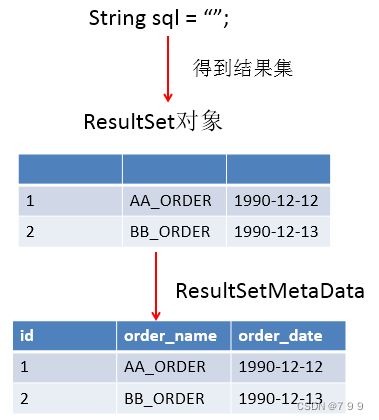
问题1:得到结果集后, 如何知道该结果集中有哪些列 ? 列名是什么?
需要使用一个描述 ResultSet 的对象, 即 ResultSetMetaData
问题2:关于ResultSetMetaData
- 如何获取 ResultSetMetaData: 调用 ResultSet 的 getMetaData() 方法即可
- 获取 ResultSet 中有多少列:调用 ResultSetMetaData 的 getColumnCount() 方法
- 获取 ResultSet 每一列的列的别名是什么:调用 ResultSetMetaData 的getColumnLabel() 方法
使用BsaeDao再次减少重构
Dao层的基类,把Dao层重复的代码逻辑放到BaseDado中,减少开发
package B_DSCP.Dao;
import Util.JdbcUtil;
import java.lang.reflect.Field;
import java.lang.reflect.ParameterizedType;
import java.lang.reflect.Type;
import java.sql.*;
import java.util.ArrayList;
import java.util.List;
public class BaseDao<T> {
Class<T> clazz;
//得到当前对象,父类声明的返回类型
{
//获取当前BaseDAO的子类继承的父类中的第一个泛型
// - this = UserDao extends BaseDaoUserDao1
package B_DSCP.Dao;
import B_DSCP.po.User;
import java.util.List;
public class UserDao1 extends BaseDao<User>{
/**
* 查询所有
* @return
*/
public List<User> find() {
String sql = "SELECT `id`, `name`, `password`, `address`, `phone` from user";
return super.findList(sql);
}
/**
* 查询主键对应的记录
* @param id
* @return
*/
public User get(Integer id) {
String sql = "SELECT `id`, `name`, `password`, `address`, `phone` from user where id = ?";
return super.findOne(sql, id);
}
/**
* 添加
* @param user
* @return 返回语句影响的函数
*/
public int insert(User user) {
String sql = "insert into user(`name`, `password`, `address`, `phone`) values(?,?,?,?)";
return super.update(sql, user.getName(), user.getPassword(), user.getAddress(), user.getPhone());
}
/**
* 删除
* @param id
* @return 返回语句影响的函数
*/
public int delete(Integer id) {
String sql = "delete from user where id = ?";
return super.update(sql, id);
}
/**
* 添加
* @param user
* @return 返回语句影响的函数
*/
public int update(User user) {
String sql = "update user set `name`=?, `password`=?, `address`=?, `phone`=? WHERE `id` = ?";
return super.update(sql, user.getName(), user.getPassword(), user.getAddress(), user.getPhone(), user.getId());
}
}
